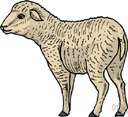bleat
(redirected from bleats)Also found in: Thesaurus.
bleat
(blēt)n.
1.
a. The characteristic cry of a goat or sheep.
b. A sound similar to this cry.
2. A whining, feeble complaint.
v. bleat·ed, bleat·ing, bleats
v.intr.
1. To utter the characteristic cry of a goat or sheep.
2. To utter a sound similar to this cry, especially a whine.
v.tr.
To utter in a whining way.
[Middle English blet, from bleten, to bleat, from Old English blǣtan.]
bleat′er n.
American Heritage® Dictionary of the English Language, Fifth Edition. Copyright © 2016 by Houghton Mifflin Harcourt Publishing Company. Published by Houghton Mifflin Harcourt Publishing Company. All rights reserved.
bleat
(bliːt)vb
1. (intr) (of a sheep, goat, or calf) to utter its characteristic plaintive cry
2. (intr) to speak with any similar sound
3. to whine; whimper
n
4. the characteristic cry of sheep, goats, and young calves
5. any sound similar to this
6. a weak complaint or whine
[Old English blǣtan; related to Old High German blāzen, Dutch blaten, Latin flēre to weep; see blare]
ˈbleater n
ˈbleating n, adj
Collins English Dictionary – Complete and Unabridged, 12th Edition 2014 © HarperCollins Publishers 1991, 1994, 1998, 2000, 2003, 2006, 2007, 2009, 2011, 2014
bleat
(blit)v.i.
1. to utter the cry of a sheep or goat, or a sound resembling such a cry.
2. to talk in a whining, complaining tone.
3. to babble; prate.
v.t. 4. to utter with or as if with a bleat.
n. 5. the cry of a sheep or goat.
6. any similar sound: the bleat of distant horns.
7. foolish or complaining talk; babble.
[before 1000; Middle English bleten, Old English blǣtan]
bleat′er, n.
bleat′ing•ly, adv.
Random House Kernerman Webster's College Dictionary, © 2010 K Dictionaries Ltd. Copyright 2005, 1997, 1991 by Random House, Inc. All rights reserved.
bleat
Past participle: bleated
Gerund: bleating
| Imperative |
|---|
| bleat |
| bleat |
Collins English Verb Tables © HarperCollins Publishers 2011
ThesaurusAntonymsRelated WordsSynonymsLegend:
Switch to new thesaurus
| Noun | 1. | bleat - the sound of sheep or goats (or any sound resembling this) cry - the characteristic utterance of an animal; "animal cries filled the night" |
| Verb | 1. |  bleat - talk whiningly bleat - talk whiningly |
| 2. |  bleat - cry plaintively; "The lambs were bleating" bleat - cry plaintively; "The lambs were bleating" |
Based on WordNet 3.0, Farlex clipart collection. © 2003-2012 Princeton University, Farlex Inc.
bleat
verb
2. complain, carp, fuss, moan, bitch (slang), groan, grieve, lament, grumble, whine, growl, grouse, gripe (informal), beef (slang), bemoan, whinge (informal), find fault, put the boot in (slang), bewail, kick up a fuss (informal), grouch (informal), bellyache (slang), kvetch (U.S. slang) They are always bleating about 'unfair' foreign competition.
Collins Thesaurus of the English Language – Complete and Unabridged 2nd Edition. 2002 © HarperCollins Publishers 1995, 2002
Translations
bečetmečet
bræge
béget
jarma
mekenti
blēt
bečaťmečať
melemek
bleat
[bliːt]Collins Spanish Dictionary - Complete and Unabridged 8th Edition 2005 © William Collins Sons & Co. Ltd. 1971, 1988 © HarperCollins Publishers 1992, 1993, 1996, 1997, 2000, 2003, 2005
bleat
[ˈbliːt] n
(= sound) [goat, sheep] → bêlement m; [person] → chevrotement m
(= complaint) → plainte f
vi
(= complain) to bleat about sth → se plaindre de qch
Collins English/French Electronic Resource. © HarperCollins Publishers 2005
bleat
Collins German Dictionary – Complete and Unabridged 7th Edition 2005. © William Collins Sons & Co. Ltd. 1980 © HarperCollins Publishers 1991, 1997, 1999, 2004, 2005, 2007
Collins Italian Dictionary 1st Edition © HarperCollins Publishers 1995
bleat
(bliːt) verb to make the noise of a sheep, lamb or goat. The lamb bleated for its mother.
Kernerman English Multilingual Dictionary © 2006-2013 K Dictionaries Ltd.